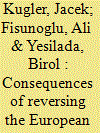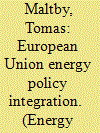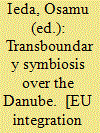| Srl | Item |
| 1 |
ID:
137819


|
|
|
|
|
| Summary/Abstract |
Today, financial crisis once again threatens the unity among member states and future of the European Union. The magnitude of the problem is so grave that observers and analysts have concluded a big decision must be made regarding fiscal union (thus political union) to save EMU. “Is this really the end of the road for Eurozone?” Using Power Transition theory, our analysis shows that trust and relative political capabilities are essential to build a stable Union. While it is clear that the center of global politics is shifting away from Europe and the United States to the Asian giants—the transition from West to East can be effectively planned so that the future units are satisfied with each other rather than distrustful, dissatisfied, and contentious. The slowdown of integration is not simply a regional problem with serious consequences for the economic stability of Europe. Far more importantly, our analysis suggests that the process of integration that has reduced tensions within a region previously characterized by major wars may be declining and that this in and of itself could reset the stage not only for regional confrontations but increase the likelihood that global wars may once more be considered as means to solve disputes. The European Union cannot afford to move from the cooperative contest to a confrontational one where solutions are arrived at by force rather than reason. Therefore, the challenge for European leaders is to resolve the current crisis in the EMU and build upon it a reinvigorated union that once more provides a path for complete regional integration.
|
|
|
|
|
|
|
|
|
|
|
|
|
|
|
|
| 2 |
ID:
119818


|
|
|
|
|
| Publication |
2013.
|
| Summary/Abstract |
Focusing on gas, this article explores the role of the European Commission in the process of European Union energy security policy development, and the extent to which the policy area is becoming increasingly supranational. Situating the article within the literature on agenda-setting and framing, it is argued that a policy window was opened as a result of: enlargement to include more energy import dependent states, a trend of increasing energy imports and prices, and gas supply disruptions. From the mid-2000s, the Commission contributed to a shift in political norms, successfully framing import dependency as a problem requiring an EU-level solution, based on the institution's pre-existing preferences for a diversified energy supply and internal energy market. Whilst Member States retain significant sovereignty, the Commission has achieved since 2006 creeping competencies in the internal, and to a lesser extent external, dimensions of EU energy policy.
|
|
|
|
|
|
|
|
|
|
|
|
|
|
|
|
| 3 |
ID:
135184


|
|
|
|
|
| Publication |
Sapporo, Uyana Tomohiko, 2014.
|
| Description |
133p.Pbk
|
| Series |
Slavic Eurasian studies; no.27
|
| Standard Number |
9784938637804
|
|
|
|
|
|
|
|
|
|
|
|
Copies: C:1/I:0,R:0,Q:0
Circulation
| Accession# | Call# | Current Location | Status | Policy | Location |
| 058014 | 320.12437309439/IED 058014 | Main | On Shelf | General | |
|
|
|
|